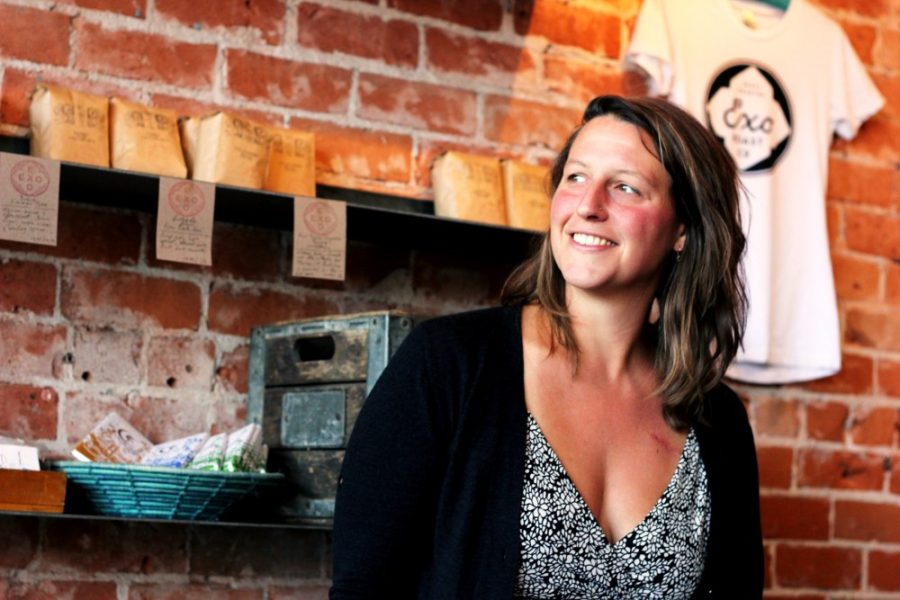Sitting in Exo Roast Co., her favorite coffee shop, Kati Standefer looks at home among the faded red brick and dark wood tones. The room feels open with its high ceilings, and natural light streams in from the large windows that make up the front wall. Standefer, who chooses not to have Wi-Fi at home, can be found here most mornings with her laptop and a stack of papers.
Standefer, a 28-year-old studying creative nonfiction in the Masters of Fine Arts program, is working on a Kickstarter campaign. The campaign, which ends Saturday, is to raise funds for her book project, “Mountains In My Body: A Memoir.” As of Thursday evening, she had raised a little over half of her $16,000 goal with more than 160 backers.
She has mere days to gain the remaining support. Her book will trace the backstory of her internal cardiac defibrillator, which has created a raised, shiny scar on the left side of her chest. As she explains the project’s origin, she leans forward in excitement.
“At age 7 I told my parents that I was going to move to Wyoming, live in a cabin in the woods and be a writer,” she said.
After getting her undergraduate degrees in sociology and English with a fiction writing emphasis at Colorado College, Standefer moved to Wyoming to gain life experience. At 22, she was sexually assaulted. The incident provided her with a new lens through which to view sexual relations: Consent, which will later appear in her book. Over the next two years, she worked various odd jobs so she could focus on her writing. Many of the jobs played on her passions in life: working as an inner city youth wilderness leader to address social justice, environmental activism and poverty, as well as working as a sexual health educator to raise awareness about gender issues and gender violence.
Standefer might have lived out her childhood fantasy as a writer in Wyoming had she not passed out without warning in a parking lot in June 2009. At 24, she was diagnosed with congenital long QT syndrome, a potentially life-threatening arrhythmia. Her younger sister had been diagnosed with the same problem and had an ICD implanted two years before.
After her collapse, Standefer lived with the fear that she could die at any moment. She did not have any medical insurance or the money for the machine that could potentially save her life. She also struggled with the implications of actually getting the defibrillator. Because of her natural ambivalence toward technology, she could hardly imagine a life dependent on machinery in such an intimate way. In the end, her fear and the persistence of her sister’s doctor won.
She then had to find a way to pay for the device. In 2009, she could not get coverage under the U.S. health care system without working full-time for a company that provided benefits. She began to question her faith in writing, which she felt had betrayed her — had she taken a normal job after college, she would’ve had insurance.
In June 2010, after recovering from other serious medical complications, Standefer said her “body took the forefront” in her life. Her interest in the body, consent and medical technology deepened, and she began to look for the connection among them.
She applied for the UA’s MFA program, partly because it would provide her with medical insurance — she is an employed teacher as part of the program — and because she knew she needed to improve her writing. She moved to Tucson after being accepted and is currently teaching a creative nonfiction writing workshop.
For Standefer, the years with the defibrillator eased her qualms about technological dependence — until last November. While she was playing in an intramural soccer match, her ICD suddenly malfunctioned and sent three unnecessary shocks to her heart. She said the shocks, which knocked her to the ground, were incredibly painful and terrifying. While lying on the ground, Standefer said a question came to her mind: Can a life-saving device cause death because of what is required to make it?
That question led her to the outline for her book project. She has attempted to trace back where the various metals and parts of her defibrillator originated, and has found mining as the starting point. In her book, she will contrast the scientific deconstruction of the defibrillator with her memoir about the increasing complexity of her attitude toward the ICD.
If her Kickstarter campaign is successful, Standefer will begin her search by traveling to Madagascar to investigate a socially responsible mine. She wants to see what the sustainability looks like on paper versus its effect on the communities and people around the mine. She said she hopes the research and writing will help her better understand her ambivalence toward the defibrillator and clarify the implications of such a device. Her ICD is due for replacement in a couple of years, and, with the help of this book, she intends to more fully explore what she’s really consenting to.
“I am no longer guaranteed the long life we’re promised as children,” she said. “So what am I going to do with mine?”









